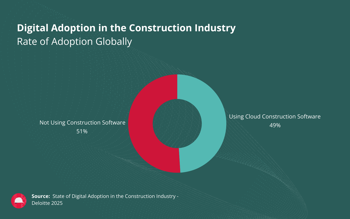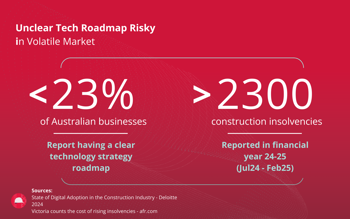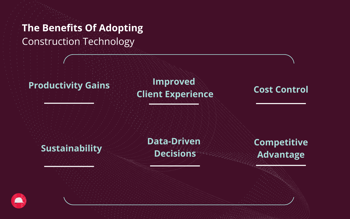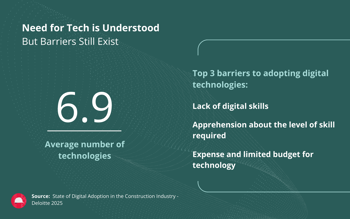Why the Australian Construction Sector Must Embrace Technology to Survive
In 2025, digital transformation is no longer a ‘nice-to-have' for Australian construction.
It is now the baseline expectation.
For too long, construction has lagged behind other sectors in adopting modern technologies. But with margin pressure mounting, investor scrutiny increasing, and project complexity ever-growing, construction technology is now essential for staying competitive.
Market volatility and scrutiny is taking an increasing toll on the Australian construction sector, with ASIC reporting 3,595 construction firm insolvencies in the 2025 financial year, a sharp 21% increase from FY2024.*
Deloitte’s 2025 State of Digital Adoption in the Construction Industry report states that in 2024, Australian businesses invested, on average, 25% of expenditure on new technologies compared to 30% in Hong Kong and 28% in Singapore.
It's becoming clearer that if you’re still running your construction business on spreadsheets, siloed systems and unautomated workflows, you’re not just inefficient, you may also be signalling to both clients and investors that your company isn’t built for the future.
The good news is that all the tools are there for the Australian construction sector to catapult itself into the digital age.
Construction technology is now a competitive advantage
Modern construction is a high-stakes, low-margin industry. Winning bids increasingly come down to more than just price. Demonstrating project control, transparency and resilience are also vital.
Construction companies that can’t show they have the tools to manage complexity at scale risk being left behind.
Adopting construction technology, such as a modern, integrated ERP system, shows:
- You can deliver complex projects on-time and on-budget
- You have real-time visibility across finance, operations and governance
- You meet compliance and reporting standards with ease
- You’re a reliable partner for investors and clients alike

Why is digital transformation essential in construction?
The productivity crisis in construction is real. Australian construction workers are 25% less productive than a decade ago*. Costs continue to climb. Project timelines are stretched thin. Yet many firms still lack the systems to track, measure and optimise productivity across the board.
Digital transformation changes that. With the right tools, construction companies can unify fragmented teams, bring clarity to their data, and automate time-consuming manual processes.
When done right, construction technology enables:
- Faster, better informed decision-making
- Greater efficiency across the construction lifecycle
- Improved site safety, quality and compliance
- Stronger financial performance and protected margins
- In short, it puts you back in control.
In fact, research conducted by the McKinsey Global Institute indicates that digital transformation can result in a 14-16% increase in productivity on average*.

Construction technology as a strategic investment
Construction technology can be viewed as a risky cost by stakeholders. While upfront costs are inevitable, it’s imperative that the sector shifts its mindset, viewing digital transformation as a strategic investment — one that directly improves the ability to win work, boost productivity, deliver projects and grow sustainably.
Deloitte’s State of Digital Adoption in the Construction Industry 2025 report, which surveyed over 900 APAC construction companies, found that over 80% of those surveyed reported a positive ROI from data analytics, mobile apps, or construction management software.
Investors and developers also increasingly view the use of construction technology as a mark of credibility, as it shows that businesses are serious about managing risk, operating efficiently, and meeting the compliance expectations of today’s regulatory landscape.
Modern technology is also a major advantage during tendering, giving clients confidence that a business has the tools to handle large-scale, complex work.

The 6 key benefits of adopting construction technology
Digital tools like cloud-based construction ERP, BIM and mobile applications unlock tangible improvements for construction businesses, including:
1. Productivity gains: Streamlined processes, real-time data sharing and fewer manual inputs result in faster, more effective delivery
2. Cost control: Automated reporting, accurate forecasting and budget tracking help protect margins
3. Better client experience: Digital client portals and transparent communication keep clients both engaged and informed
4. Sustainability: Automation, advanced analytics and reporting help manage projects and track data to support sustainable operations
5. Data-driven decisions: Dashboards and analytics tools help businesses spot risks and opportunities early
6. Competitive advantage: With Australia considered ‘middle of the pack’ when it comes to digital transformation, businesses that embrace it have a competitive edge
Overcoming the challenges of Digital Transformation in Australia
Despite the clear benefits, construction companies in Australia face real barriers when it comes to adopting technology.
Cost is still the biggest barrier to technology adoption, especially in a high-inflation market where every investment is scrutinised. However, the long-term gains in productivity, cost control and project delivery far outweigh the upfront spend.
An ageing workforce is also a major factor contributing to a slower adoption of construction technology in Australia. While choosing user-friendly, construction-specific solutions can bridge this divide, it's important to invest in the next generation of digital natives.
Perhaps the most overlooked challenge is the lack of a clear technology strategy roadmap, with only 23% of construction businesses in Australia reporting to have one*.
Without clear direction, digital tools risk becoming disconnected and underused. Building a simple, measurable technology roadmap aligned to business outcomes is essential to growth and success.
The obstacles to digital transformation are real, but not insurmountable, and far less risky for construction businesses than falling behind.

The time to act is now
The longer construction businesses delay digital transformation, the further they will fall behind. Unlike in previous decades, that gap is no longer something construction companies can ignore, it’s now business critical.
Technology isn’t about chasing trends. It’s about future-proofing operations, winning more work, and protecting bottom lines in an industry where profit margins leave little room for inefficiencies.
The construction companies that will stand the test of time are those who act now.
Learn more about Access Coins - The ERP built for construction
Fill in the form and one of our experts will be in touch to schedule a personalised demo at a time that works best for you.

 UK
UK
 SG
SG
 MY
MY
 US
US
 IE
IE

